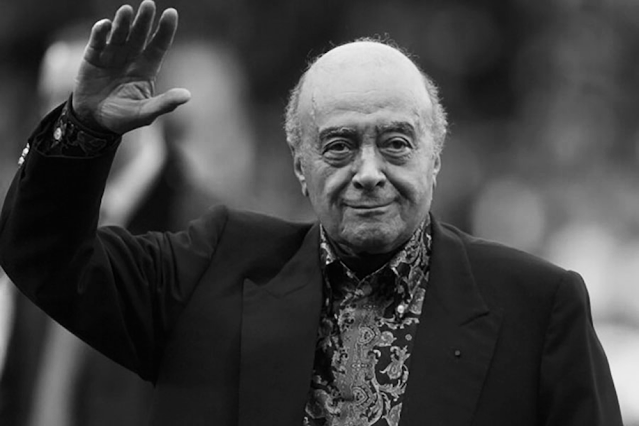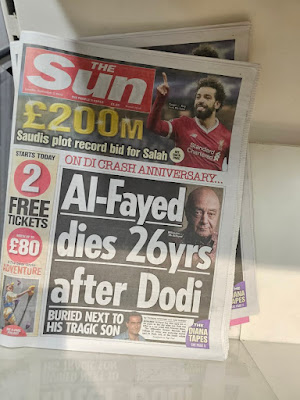When Egyptian media outlets announced that Alexandria-born billionaire Mohamed Al-Fayed had passed away and his funeral was held in London on Friday, I was sceptical at first.
 |
| Mohamed Al-Fayed (1929-2023) AP |
Photos of the funeral held at Regent's Park Mosque in London show a computer-printed sheet hung on one of the mosque's pillars announcing that the funeral service for businessman Mohamed Al-Fayed would be held after Friday prayers. The photos went viral, and many people saw them as evidence of his death.
I couldn't believe that Al-Fayed's funeral would be like that. The announcement of his death and funeral on a poorly typed black-and-white piece of paper was a complete contradiction to the loud and controversial life of Mohamed Al-Fayed.
 |
| The announcement at the Mosque |
For hours, I didn't believe it and thought it was a case of mistaken identity, especially since all the news came from Cairo and not London. Members of the Egyptian community in London said that they learned of the news from the mosque and attended the funeral, but it seems that there is no direct connection between Al-Fayeds’ younger generations and the community, unlike their late father.
For the Egyptian community in the UK, there was an Egyptian king before Mo Salah, and his name was Mo Al-Fayed. "In an ironic twist, both kings made the front page of the tabloid press on Saturday and now I wonder if the older Mo, who loved football, met with the younger Mo in recent years.”
 |
| The two Mos on the Sun Mo Fayed is dead, Long Live Mo Salah |
According to Egyptians who attended the funeral, the Regent's Park Mosque was so full during the prayer that some had to pray in the mosque's garden.
This was not the first time that rumours of his death had circulated in the Egyptian media.
Then, his family issued their official statement late Friday through Fulham FC, which he owned and played a role in restoring its position for 16 years in the British football world.
“Mrs Mohamed Al-Fayed, her children and grandchildren wish to confirm that her beloved husband, their father and their grandfather, Mohamed, has passed away peacefully of old age on Wednesday, August 30, 2023, ″ his family said in the short statement.
“He enjoyed a long and fulfilled retirement surrounded by his loved ones. ″ It added.
The family's belated and brief statement did not do justice to a long and controversial life that began in Alexandria, Egypt, in January 1929. From the docks of Alexandria to the desert of Dubai to Paris in spring to the fog of London, Mohamed Al-Fayed lived a life full of drama and intrigue with a deadly mix of politics and economics.
He retired to a 17th-century estate in Surrey, where he was buried beside his son Emad or as commonly known worldwide Dodi Al-Fayed in the family mausoleum.
 |
| Al-Fayed Mausoleum in his estate |
Al-Fayed acquired the English estate in the 1970s. I remember him once saying that he wanted to be mummified and entombed in a pyramid over Harrods, the department store he and his brother Salah acquired in 1985. However, that plan apparently changed when he sold Harrods to Qatar's sovereign wealth fund for $2.4 billion in 2010.
I respected the tribute that Fulham FC paid to their former owner. I wish that Harrods had done the same, but it seems that the Qatari ownership wants to erase Al-Fayed's era from the famous store.
Personally, I believe that Harrods was livelier and more vibrant during Al-Fayed's ownership, giving it an Egyptian spirit.
One of my wishes in my younger and more naïve days was that Al-Fayed would acquire Omar Effendi's department store and restore it to its former glory.
However, as far as we know, the man who helped to build Dubai and its Jebel Ali Free Zone commercially did not have any investments in Egypt, nor did he seem to be interested in doing so.
He did donate to charities, though.
Nevertheless, till his death on Wednesday, Mohamed Al Fayed maintained his position as the fourth richest Egyptian and the twelfth richest Arab in the Forbes Middle East annual list released in May.
He was the oldest richest Egyptian and Arab then.
Dodi’s Dad
After his passing, Mohamed Al-Fayed was introduced to readers worldwide primarily as the father of Dodi Al-Fayed, who had been the boyfriend/fiancé of the late Princess Diana. Although there were many facets to Mohamed Al-Fayed's life, his connection to Dodi Al-Fayed remained prominent, especially considering the timing of his death on the eve of the 26th anniversary of the tragic demise of Princess Diana and Dodi Al-Fayed in Paris.
That tragic incident and its aftermath marked the beginning of Al-Fayed's decline.
The loss of a child is a devastating experience for any parent, and this sentiment resonates deeply in Egypt. “Losing a child breaks one’s back” we say and it broke Mohamed Al-Fayed’s back.
Dodi Al-Fayed was not only his eldest child but also the heir to a substantial empire, making his untimely demise all the more shocking to the world.
At the time when Dodi Al-Fayed became Princess Diana's partner, with speculations of their impending engagement, Mohamed Al-Fayed was at the zenith of his success. However, what ensued was widely known—a bitter and public feud with the heart of one of Britain's most revered institutions: The Royal Palace.
The matter transcended a mere dispute over a British passport; it escalated with Dodi's tragic death. Al-Fayed no longer cared about the prospect of receiving a British passport, especially after the loss of his firstborn in such a heart-wrenching accident.
In a bold and unabashed manner reminiscent of an authentic Alexandrian street fight, Al-Fayed not only pointed fingers but also accused the British Royal Family, particularly the late Prince Philip, of orchestrating Diana and Dodi's deaths.
According to Mohamed Al-Fayed, Princess Diana was killed because she was pregnant with Dodi's child, and they were planning to marry. The British Royal institution allegedly rejected the idea of the future King of the UK having a Brown Muslim half-brother. While he stated these allegations explicitly, even with his vast resources, he couldn't substantiate them beyond being regarded as a conspiracy theory.
As time passed, the memory of Diana and Dodi began to fade, and Mohamed Al-Fayed eventually came to terms with his grief, having previously experienced denial and anger.
Two decades later, the world bore witness to the extent of bias and racism directed at Meghan Markle, Diana's daughter-in-law, both in the British media and on social platforms. The subsequent revelations of her mistreatment within the Royal institution shed light on how challenging it might have been for Dodi to navigate a similar environment if he and Diana had survived.
Many, particularly from younger generations, began to grasp why it would have been difficult to envision Diana marrying a man of colour and giving birth to a child who would be both Muslim and a half-sibling to the future King of the UK.
It's worth noting that many people, even beyond Egypt, have come to believe Al-Fayed's theory. In Egypt, it has practically become accepted as fact.
Mohamed Al-Fayed reemerged onto the public stage, reintroducing himself to younger generations through Netflix's popular series "The Crown," which vividly portrayed Diana's struggles and Prince Philip's cautionary warnings about the family's unwavering commitment to the Crown.
Palestinian actor Salim Daw portrayed the Alexandrian man with authenticity, while credit must be given to renowned Egyptian screenwriter Belal Fadl for crafting the Egyptian Arabic dialogue with an Alexandrian accent, offering "The Crown" fans a taste of Alexandria.
It remains uncertain whether the show's upcoming final season will touch upon the poignant moment when Mohamed Al-Fayed tearfully expressed on an Egyptian TV channel that, had he known how it would all end, he would have kept Dodi away from Diana.
In the end, I see Dodi's death was like that scene in Godfather III when Michael Corleone sees his daughter killed because of him. Similarly, Mohamed Al-Fayed died peacefully in old age in his estate just like Corleone, the two main differences are that he was not a crime boss despite undisclosing his main source of wealth and he has got other four children and saw his grandchildren.
Maybe he did not lose after all if he thought about it. After all, it was Dodi who introduced him to his wife and the mother of his other four children.
May Allah bless the soul of Mohamed Al-Fayed and bring patience to his loved ones.
P.S. Many people are wondering why Mohamed Al-Fayed kept his humble beginnings in Alexandria under wraps for years and my own explanation is that Al-Fayed came out of the Egyptian classicist society to the British racist and classicist society.
Also, I can’t ignore the fact that Al-Fayed gave an example of what to avoid if you want to become a British elite if you are of Egyptian origin. Mohamed Mansour who comes from a wealthy Alexandrian family was proof of that.


No comments:
Post a Comment
Thank You for your comment
Please keep it civilized here, racist and hateful comments are not accepted
The Comments in this blog with exclusion of the blog's owner does not represent the views of the blog's owner.